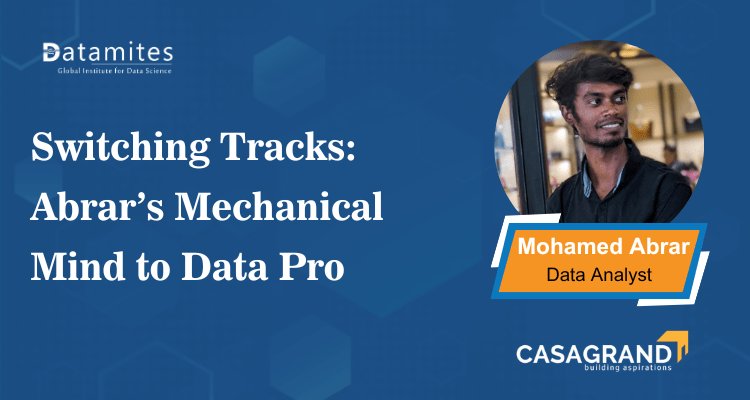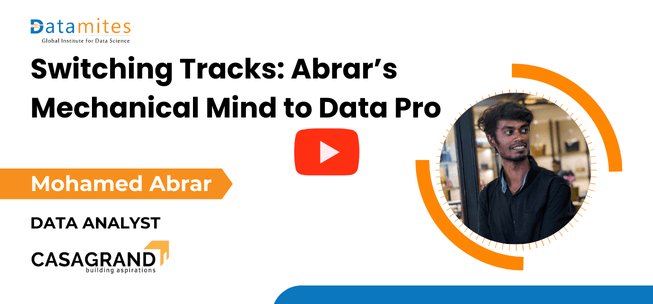Switching Tracks: Abrar’s Mechanical Mind to Data Pro
Discover how Mohamed Abrar, a mechanical engineer turned Data Analyst, successfully transitioned into the data domain with DataMites. Learn about his journey, key tools, interview tips, and valuable advice for non-technical students aspiring to break into Data Science and Analytics.

Transitioning from a non-technical background to a thriving role in the data domain might sound like a distant dream—but for Mohamed Abrar, it became a reality. A mechanical engineering graduate turned Data Analyst at Casagrand, Abrar's journey is an inspiration for countless individuals eyeing a career in Data Science or Analytics without prior programming exposure. In this insightful Q&A session, he shares how he navigated the shift, what tools and skills he prioritized, and practical advice for aspiring analysts.
Mechanical Engineer to Data Analyst: Abrar’s Career Switch
Abrar, a mechanical engineer by qualification, took a bold leap from working with machines to working with data. His inspiring journey into the world of data analytics showcases the power of determination and skill transformation.
1. Can you tell us a bit about your background and how you got into data science?
Yes! I’m Mohamed Abrar, a mechanical engineering graduate. After working as a Graduate Engineering Trainee in the mechanical field, I decided to transition into the data domain. I joined a Data Science course at DataMites and, after learning from scratch, I am now working as a Data Analyst at Casagrand.
2. What inspired you to pursue Data Science despite coming from a mechanical background?
I’ve always been interested in machine learning. Though I had no prior experience in Python or coding, I was motivated to learn. I began focusing on Python, machine learning, statistics, and SQL from the ground up, using platforms like HackerRank for daily practice.
3. How did you manage the initial challenges of learning coding and tools?
It was tough at first, but I was consistent. I practiced 2 hours daily, used online resources, and implemented everything I learned in real-time projects. My focus was on SQL, dashboard creation using Power BI, and EDA, which eventually helped me land the job.
4. How many interviews did you attend before landing the job?
I appeared in five interviews, and the interview with Casagrand involved three technical rounds. They primarily asked situation-based and application-oriented questions, rather than direct coding tasks.
5. Can you share some sample interview questions you faced?
Sure! Some of the interesting ones were:
- How do you convert a numerical column into a categorical one?
- How do you handle two separate tables with related data in Power BI and visualize them?
- SQL logic-based questions like joining and transforming data from different sources.
Read the articles:
- From Writing content to Writing Code: Aaspruha’s Shift
- From Roots in Biology to Rising in Data Analytics: Poojitha’s Journey
- Amar Raja’s transition as a Financial Data Analyst at Zoho
6. Did you face any Python-related questions?
Not for this analyst role, but in other interviews, I was asked to reverse a list, and write loop-based code using Python. Most were basic logic-building questions.
7. When did you start applying for jobs?
I began applying during my internship phase right after completing the course. It took about 2 months time period from course completion to getting placed.
8. What was your internship project experience like?
I completed 20+ self-projects, including machine learning and EDA-based projects. During my internship at DataMites Institute, I worked on 4 capstone projects and 1 client project, gaining hands-on experience.
9. What tools and platforms did you primarily use?
The tools that I used are:
- Python & Jupyter Notebook for machine learning
- Power BI for dashboard creation
- SQL for querying
- Excel for preprocessing and data handling
10. How is your current job experience as a Data Analyst at Casagrand?
It’s exciting and new. The biggest change is working with live data from servers, which I hadn’t experienced during training. I now work with raw data from multiple sources, preprocess using Excel, and visualize using Power BI. SQL and Excel are heavily used in my current role.
11. What is your advice to non-technical students aspiring to enter the data domain?
Be consistent. Even 1 hour of daily practice in Python, SQL, or dashboarding tools can make a big difference. Focus on understanding concepts, work on projects, and don’t give up. Consistency beats intensity when it comes to learning tech from scratch.
Key Takeaways from Abrar’s Data Analyst Journey
Here are the key lessons from Abrar’s inspiring journey from a mechanical engineer to a successful data analyst that can guide any aspiring career switcher in the field of data analytics.
- Non-technical background is not a barrier – Abrar came from mechanical engineering and successfully transitioned to data analytics.
- Learning from scratch is possible – With zero coding knowledge, he mastered Python, SQL, and Power BI.
- Consistent practice matters – Daily practice, especially on platforms like HackerRank, built his confidence and skills.
- Project-based learning works – 25+ hands-on projects helped him solidify his learning and impress recruiters.
- Interview preparation is more situational based– Many companies test logical thinking over just coding knowledge.
- Key tools for Data Analyst roles – SQL, Power BI, Excel, and data preprocessing were crucial in his current job.
- Job application can begin during internship – Abrar got placed within 2 months of completing his course.
Motivation and self-initiative are key – He went beyond the curriculum and learned additional skills independently. If you're someone looking to break into the data field without a tech background, Abrar’s journey is proof that it's not only possible but achievable with dedication and the right learning strategy.
Abrar’s journey highlights how mastering data analytics can open doors to impactful careers, especially as industries increasingly rely on AI-driven insights to boost performance, profitability, and future readiness.
Statista research reveals that retailers utilizing AI and machine learning-powered analytics see a 5–6% boost in both sales and profit growth compared to those who haven't implemented these technologies.
Also refer to the articles:
- Data Analyst Career Scope in Bangalore
- Data Analyst Career Scope in Chennai
- Data Analyst Career Scope in Pune
Joining offline data analyst courses in Bangalore and cities like Chennai, Hyderabad, Pune, Ahmedabad, Coimbatore, Delhi, Jaipur, and Mumbai offers strong industry exposure, valuable networking, and improved job prospects—building a solid pathway to careers in data analysis and software development.
DataMites Institute is a leading provider of top-tier courses in Data Analytics, Data Science, Python Programming, Machine Learning, and AI. Offering a job-oriented curriculum, DataMites ensures that students not only grasp theoretical concepts but also gain practical, hands-on experience through live training sessions. With flexible learning options, the institute provides both online and offline modes, catering to the diverse needs of learners.
Students at DataMites benefit from real-time projects and internship opportunities, allowing them to build a strong portfolio and become job-ready. This practical approach ensures that graduates are well-equipped to succeed in the competitive tech industry.
The Institute is accredited by IABAC and NASSCOM FutureSkills, DataMites stands as a trusted name in professional training, offering globally recognized certifications that enhance career prospects. Whether you’re a beginner or looking to upskill, DataMites is your gateway to a successful career in the rapidly evolving tech space.
DataMites provides extensive offline Data Analyst training in Hyderabad and major cities like Bangalore, Pune, Ahmedabad, Jaipur, Coimbatore, Delhi, and Mumbai—serving learners from all walks of life.

